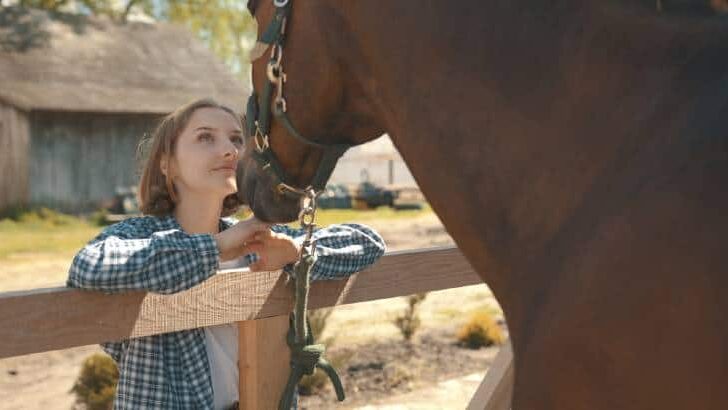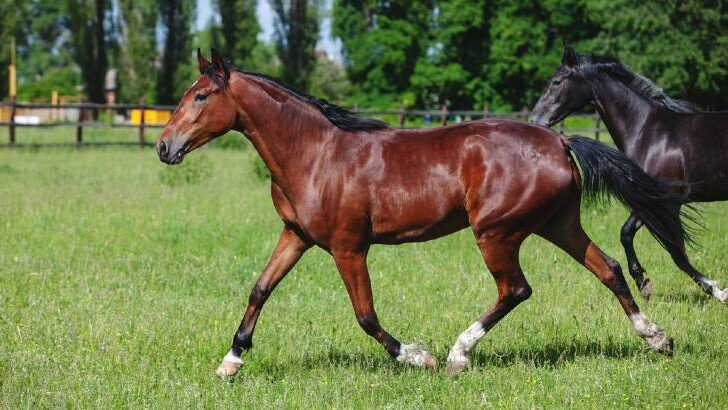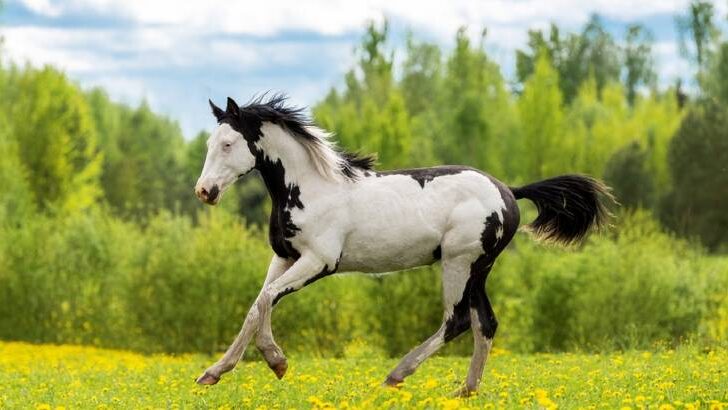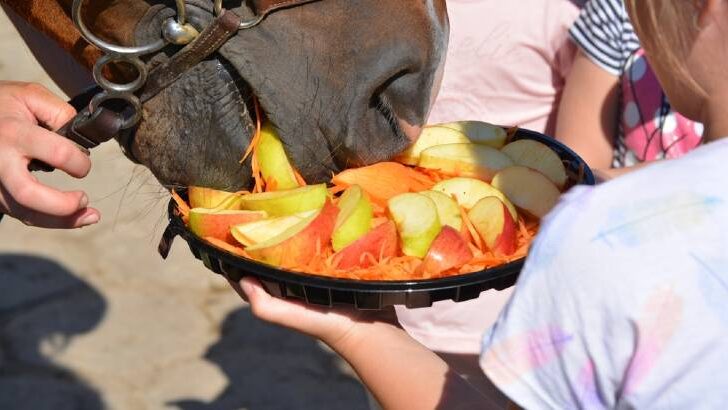Affiliate Disclaimer
As an Amazon Associate I earn from qualifying purchases. It helps me keep the website going. Thank you for your support.
Buying a horse is an exciting time. And it can be hard to go and check out a horse for sale and not fall in love with it. But what should you do if you fall for a horse that’s for sale only to be told that it windsucks? Should you buy a horse that windsucks? What issues might arise from taking on a horse with this particular vice?
Some researchers have linked windsucking to a number of health issues, and difficulties around maintaining a healthy weight. Windsucking can sometimes be reduced by modifying the horse’s diet, and daily routine. But there are no guarantees that this will make a difference. So, if you buy a horse that windsucks you need to be prepared to accept the vice along with the horse.
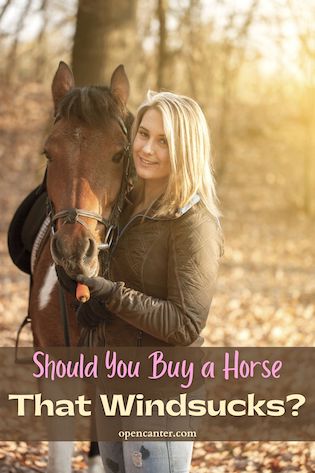
A Quick Word About the Difference Between Windsucking and Cribbing
The term ‘windsucking’ is sometimes used interchangeably with the word ‘cribbing’ or ‘crib biting’. But they are actually a bit different.
They have similarities in that both involve the horse gulping down air into its belly. This often includes the horse making a grunting noise that sounds a bit like a burp.
The difference between windsucking and cribbing is that cribbing involves the horse fixing its top teeth to a solid object. This is often the edge of a stable door, a fence post, or a feeding trough. The horse then pulls against the object and uses this action to help them draw in air.
By contrast, horses that windsuck, don’t pull against a static object. Instead, they arch their neck and draw in their stomach muscles to suck the air in.
If you are reading this and you are thinking of buying a horse that cribs, do read on. Many of the issues that affect horses that windsuck, also affect horses that crib bite. So, let’s take a look at what you need to consider…
Buying a Horse That Windsucks – The Pros and Cons
Windsucking is categorized as being a ‘stable vice’. However, there is a movement away from calling habitual behavior of this kind a ‘vice’. The word vice has negative associations, and it’s kinder to the horse to think of it as stereotypic behavior, or a stereotype.
The Disadvantages of Buying a Horse that Windsucks
Regardless of what you call it, there can be some disadvantages if you buy a horse that windsucks. So, let’s take a look at those now…
Factor 1) Health Issues for Your Horse:
The exact reason why some horses develop vices and others don’t is still under investigation. And it’s thought that there can be more than one underlying cause.
Sometimes horses can start windsucking as a response to boredom, loneliness, or stress. But it’s also been linked to digestive issues.
Gastric Ulcers
Some research indicates that there is a correlation between those horses that have gastric ulcers and those that windsuck.
There is some debate over whether horses windsuck to alleviate the discomfort and stress of having ulcers. Or whether windsucking is actually part of the reason that some horses end up with ulcers. It seems to be a chicken-and-egg situation.
Whether windsucking is the cause or the result of ulcers, there is a correlation. So, it’s thought that if a horse windsucks, there is a higher chance that it will also have gastric ulcers.
This is one reason why it’s often recommended that horses who windsuck, particularly after food, are scoped. Scoping is the process of using an endoscope to investigate the horse’s intestinal tract.
It’s worth checking with the vendor when the horse windsucks. Do they do it at particular times? While in the stable? After they eat? When they are turned out? Bear in mind that the vendor is trying to make a sale, and they may not report a completely accurate picture.
If the horse tends to windsuck after eating, then you may need to foot the bill for having the horse scoped. Windsucking after food does not inevitably mean that a horse has gastric ulcers. It may simply be a response to feeling stomach discomfort after eating.
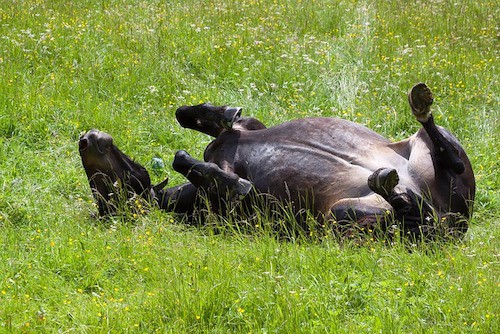
But even so, if the horse you are considering buying has stomach discomfort, then this is something to be aware of. This leads me on to the next issue to be aware of if you want to buy a horse that windsucks…
Colic
The link between windsucking and colic is a bit controversial. The question of whether horses are more susceptible to colic or not is one that has been debated for some time.
Some vets are of the opinion that windsucking does not predispose horses to colic. However, if you ask around you will find plenty of horse owners with anecdotal stories of windsucking horses that were more prone to colic.
Does this mean that windsucking causes colic? The jury is out on that one. It’s sometimes said that there is no research to link the two. However, there are some reputable sources that state categorically that there is a link.
One example is a report by the University of Florida Large Animal Hospital which states that “cribbing can predispose horses to colic…cribbing is displayed when a horse braces its teeth against an immobile object… horse can also swallow air without fixing their teeth, a vice called windsucking. Windsucking can also lead to colic” (source).
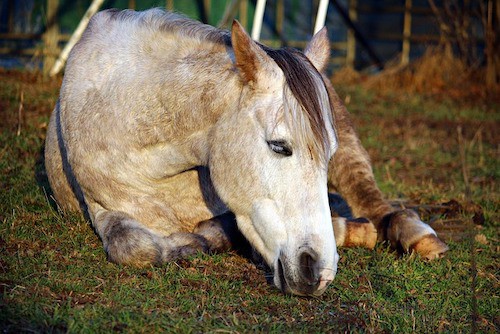
In fact, this report links both cribbing and windsucking to a particular kind of colic called epiploic foramen entrapment. This type of colic requires surgical treatment and can cause death.
So, it’s a good idea to check out whether a horse you are thinking of buying has a history of colic.
Factor 2) Difficulties Maintaining Weight
One of the other issues with horses that windsuck is that it can sometimes affect their ability to gain and keep a healthy weight. Part of the reason for this is that their belly can feel full if they are gulping down air.
The other issue is that if they are a prolific windsucker, they may choose to spend their time in the field windsucking rather than grazing.
In addition to this, if the horse is cribbing rather than windsucking, it may have sustained damage to its teeth. Quite often horses that crib will wear down their front teeth as they pull on the static object. This can make grazing difficult.
Not all cribbers have damaged teeth and not all horses that windsuck are poor doers. It depends to an extent upon how much time they spend engaged in the stereotypic behavior. But it is something to be mindful of as a potential concern.
Factor 3) Stress and Worry for You
Whether or not you should buy a horse that windsucks is also a matter of your temperament. If you are relatively easygoing and don’t let things get on top of you, having a horse with a vice may not worry you.
But if you tend to be a worrier, then this might not be the right choice for you. For a start, seeing the horse that you love engaging in repetitive behavior that makes them look stressed can be upsetting.
There are plenty of horses that windsuck who are happy enough in themselves. And some horses windsuck when they are excited, perhaps when they are anticipating food. Nevertheless, it can be unsettling to see and some owners find it distressing to witness.
You may find yourself worrying about potential vet fees as well as the horse’s general well-being and happiness. If you think that owning a horse that windsucks is going to stress you out, you may be better off finding a horse that is vice free.
Factor 4) How Would You Feel About the Noise?
Another issue that is more to do with your feelings than how your horse feels is the noise that windsucking makes.
Some horses are quite quiet when they windsuck. It’s a discrete little burping noise. But it can be quite noisy. And if you have a horse that cribs, that can also involve the rattling of a stable door.
As a repetitive noise that can wear on your nerves. If your horse is in the field most of the time and you can’t hear them this might not be an issue. But if you have a paddock just outside your bedroom window it might be more of an issue.
Some people are sensitive to noise, it’s worth considering if this is likely to grate on your nerves.
Factor 5) Finding a Place for Your Horse to Live
Even if the sight and sound of your horse windsucking doesn’t bother you, it may bother others.
You need to consider where you are going to keep your horse. If you have your own stables and land, then you are good to go.
But if you want to keep your horse at a livery stable, then you need to know how they feel about windsucking.
Some yard owners are quite understanding and will accept horses with vices at their stables. But many yard owners don’t want a horse that windsucks on their premises. There are a few reasons for this.
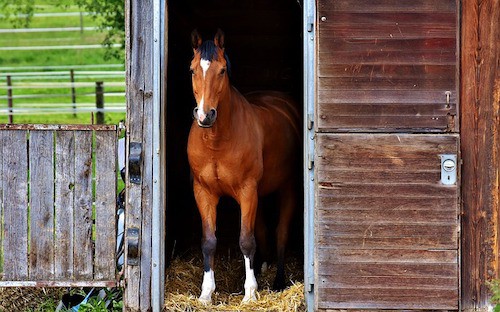
Concerns About Other Horses Copying the Behavior
Some people are concerned that other horses will pick up a vice such as windsucking if they see another horse doing it. Research has recently found that horses don’t copy each other’s vices. For example, a report written by the Ohio State University found that in a survey of horse owners, only 1% of them reported that their horse started cribbing after being exposed to other horses that crib (source).
In spite of this, some yard owners are reluctant to allow horses that windsuck or crib onto their yard.
The yard owner may not personally believe that the vice will spread to other horses. However, they want to keep the other horse owners that rent from them happy. And other owners at the stables may not feel happy about the arrival of a new horse that windsucks.
Property Damage from Cribbing
Yard owners are concerned about damage to their property. This is an issue if you want to buy a horse that crib bites rather than windsucks.
Horses can windsuck without damaging any property at all. But a horse that crib bites can destroy stable doors and fence posts. The yard owner would likely bill you for the damage. Nevertheless, most of them don’t want to have to deal with the extra work and hassle involved in fixing the damage. As a result, you might have a job finding a livery where you can keep your horse.
You can read more about the difference between windsucking and crib biting here.
Factor 6) A Horse that Windsucks is Harder to Sell
Consider whether you intend to keep the horse for a lifetime. Do you think you might want to sell the horse at some point? If so then it may not be wise to buy a horse that windsucks.
Unfortunately, horses with vices are harder to sell. And the vice will likely mean that you will have to accept a lower price at the point of sale. This may not be a point of importance to you now, but it’s worth bearing in mind. You can read more about selling a horse that windsucks here.
Factor 7) Does it Impact Your Insurance?
Some, insurance companies will increase your insurance premium if you buy a horse that windsucks. Others will apply exclusions to your policy. For example, you may not be covered by your insurer if your horse has an episode of colic or develops ulcers.
Insurance companies have different positions when it comes to the cover they offer horses with vices. But it’s definitely worth giving them a call before you commit to buying.
Factor 8) Are You Prepared for the High Maintenance?
You may find that owning a horse that windsucks is a little more high maintenance. There are measures that you can take to support your horse, and potentially help to reduce the windsucking. We will take a look at what those measures are in a moment.
But for now, it’s worth asking if you are able to go the extra mile to support a horse that may need a little extra patience. Sometimes a horse’s windsucking habit can be alleviated, but this generally takes thoughtful management and patience from the owner.
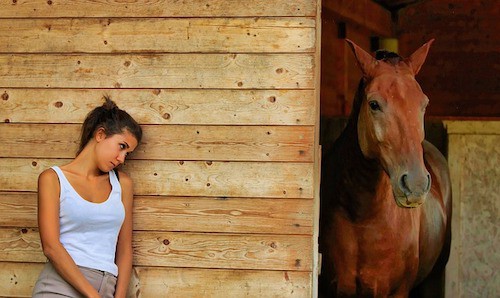
Advantages of Buying a Horse that Windsucks
Having said all of the above, plenty of people do choose to buy a horse that windsucks. And there are positives to making this choice, so let’s take a look at those now…
You could get a real bargain: Sometimes quality horses that would ordinarily be beyond your budget will become attainable to you because they have been priced lower.
Horses that windsuck can make good school horses: Owners often report that horses that windsuck are intelligent and fast learners. They tend to have strong tenacious characters and once they learn new skills they can retain them.
Windsucking can sometimes be modified: By adapting the horse’s diet, giving them supplements and carefully managing their routine, the behavior may reduce (see below).
No horse is perfect: Investing in a horse is a high-cost high-risk business! Even a horse with no apparent behavioral quirks can become unwell or end up incurring unexpected expenses.
You may find that the love you feel for your horse will outweigh any negatives that you associate with windsucking.
Things You Can Do if You Have Decided to Buy a Horse that Windsucks
Here are some measures that you can take with your horse to help reduce their reliance on windsucking. Be aware that some horses will carry on windsucking regardless of what you do and there are no guarantees.
So, if you buy a horse that windsucks, you need to be prepared to accept them as they are. Any improvement is a bonus. That being said, here are some suggestions:
- If there is any concern that your horse is windsucking because of an underlying medical issue, do consult with your vet. The vet may recommend that your horse is scoped for ulcers.
- Even if no ulcers are present, some horse benefit from dietary supplements that neutralize stomach acid. Again, it’s important to discuss this with your vet before you give your horse supplements. But some of the products that horse owners have found helpful include Settlex, Ugard, Coligon, and even Rennies.
- Lifestyle and management can make a difference. Turn your horse out as much as possible, so that they can move and graze as much as they like.
- Keep them with other horses to avoid boredom.
- Ensure that your horse has access to plenty of forage at all times.
- Reduce the amount of grain in their diet as this is known to increase stomach acid.
- Give them a healthy workload to stimulate them and keep them exercised.
A Word About Collars
Windsucking collars work by preventing the horse from bending its neck enough to windsuck. A piece of metal or tough leather presses against their windpipe if they try to arch their neck.
Collars are controversial. Some owners swear by them and find that they do reduce windsucking behavior. However, lots of owners feel that they are cruel and ineffective.
Horses windsuck for a number of reasons. Whatever the reason a particular horse is windsucking, the vice is serving some purpose for the horse. Simply preventing the behavior without addressing the underlying cause is thought to cause distress. Owners will often report that if they use a collar the horse will pick up another habit like box walking.
You are better off trying to address the underlying cause with good stable management and routine. If these adjustments don’t make a difference, the new accepted wisdom is that you need to accept the horse, quirks, and all (source).
Other Things to Be Aware of Before you Buy a Horse That Windsucks
In addition to the above, there are a couple of other issues to bear in mind before you make your decision…
Buyer Beware
Try to figure out if the vendor is genuine about the extent to which the horse windsucks Vendors are looking to make a sale, and they may not accurately report how much the horse windsucks.
It’s good to ask questions and ideally see the horse in different environments. The vendor may say that the horse only windsucks now and then.
But you may find that they turn the horse out 24/7 because the horse windsucks constantly when they are inside. If you bought the horse and it had to be put on box rest for health reasons, would the horse start windsucking non-stop? These are all factors to consider.
Final Thoughts
Buying a horse that exhibits stereotypic behavior presents challenges for a new owner. Perhaps one of the best questions you can be asking yourself is whether you are up for those challenges.
Putting this another way, is your new horse’s behavior going to be too stressful for you? If the answer to this is yes, then it may be better to keep looking and find a horse that doesn’t have a stable vice. There are lots of horses for sale, and many of them don’t engage in stereotypic behavior.
But perhaps you are someone who wouldn’t be unduly distressed seeing your horse windsuck. If you are prepared to be patient and make some adjustments to your horse’s care, then you might be someone who could buy a horse that windsucks without regrets.

